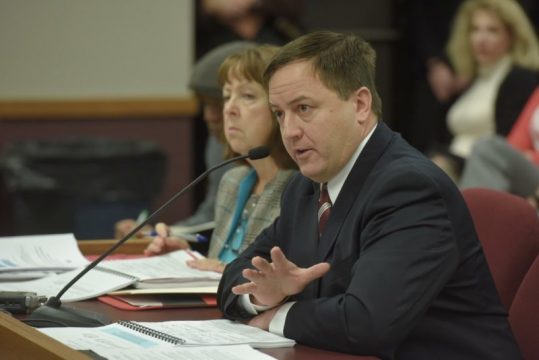JEFFERSON CITY, Mo. – Secretary of State Jay Ashcroft announced Monday that his Securities Division received Missouri’s share of a multi-state settlement with LPL Financial, LLC.
The company paid civil penalties of $499,000 to the division’s Investor Protection and Education Fund.
“This payment of civil penalties into the Investor Protection and Education Fund will help us better inform investors of risks and demonstrates our efforts to protect and serve Missouri investors,” Ashcroft said. “The securities division will continue to make sure securities firms comply with state law.”
The settlement stems from an investigation led by state securities regulators from Alabama and Massachusetts regarding the failure to establish and maintain reasonable policies and procedures to prevent the sale of unregistered, non-exempt securities by LPL to its customers.
In July 2017, the North American Securities Administrators Association (NASAA), of which the Secretary of State’s Securities Division is a member, established a task force with Massachusetts and Alabama as lead states to investigate LPL’s failure to establish and maintain reasonable policies and procedures to prevent the sale of unregistered, non-exempt securities by LPL to its customers. NASAA President Joseph P. Borg said LPL fully cooperated with the NASAA task force.
The investigation focused on LPL’s retention, use, and subsequent cancellation of certain third-party services integral to LPL’s compliance with state securities registration requirements. Investigators also looked into certain other legacy deficiencies within LPL’s compliance structure related to LPL’s controls, monitoring and reporting tools, and escalation protocols regarding the firm’s response to significant compliance issues.
State securities regulators concluded that LPL offered and sold unregistered, non-exempt securities and failed to reasonably supervise the flow of information to ensure full and proper compliance with state securities registration requirements.
While no evidence was found of willful, reckless, or fraudulent conduct by LPL, investigators did find that the firm failed to maintain adequate systems to reasonably supervise agents, staff, and employees to prevent the sale of unregistered, non-exempt securities. State investigators also determined that LPL failed to maintain books and records necessary to ensure full and proper compliance with state securities registration requirements, and failed to conduct appropriate and necessary due diligence regarding the retention, use, and subsequent cancelation of certain third-party services critical for compliance with state securities registration requirements.
LPL also was found to have acted negligently in the following: canceling certain third-party services critical for compliance with state securities registration requirements; failing to supervise agents, staff, and employees in the performance of duties with respect to systems operation, process, and checks and balances to ensure compliance with state securities registration statutes, rules, and regulations; and failing to invest sufficient and appropriate resources in personnel, expertise, systems, and operations to adequately comply with state securities registration statutes, rules, and regulations.
In addition to a civil penalty, the settlement calls for LPL to offer to repurchase from investors securities held in LPL accounts determined to have been unregistered, non-exempt equity or fixed-income securities sold since October 1, 2006. Each offer also shall include 3 percent simple interest per year. Other requirements were agreed upon for investors holding affected securities sold or transferred from an LPL account.
As part of the settlement, LPL also agreed to a “top-to-bottom” review of the integration of new securities products to assess this firm’s ability to comply with all state securities registration requirements, and all operations and procedures in connection with state registration requirements, that apply to the offer and sale of that product. The firm also agreed to a similar review of its vendor service protocols to ensure processes are in place for the identification and management of critical services used to ensure compliance with state securities laws.

